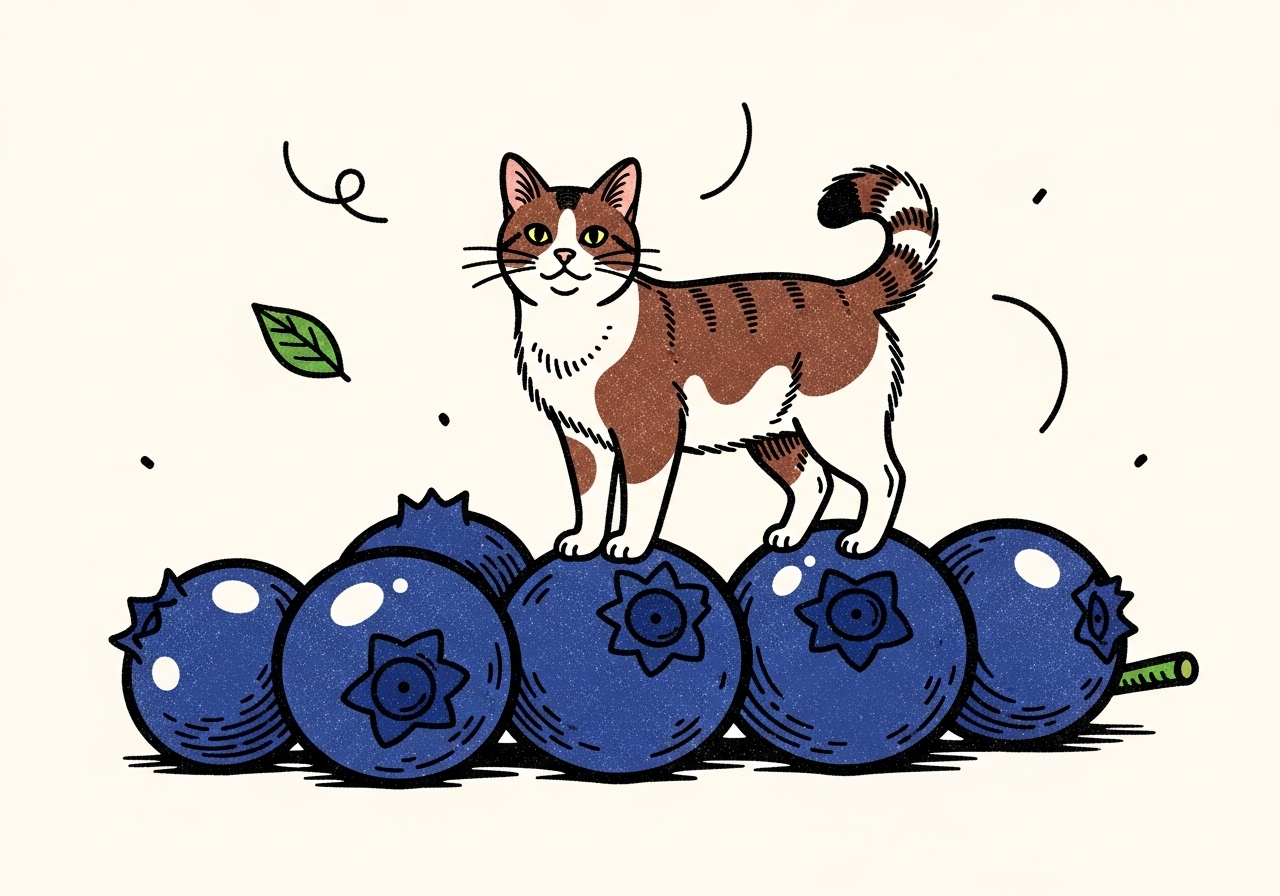Can cats eat blueberries?

Blueberries are often praised as a superfood, but are they good for cats? This article explores the non-toxic nature of blueberries, their potential antioxidant benefits, and the important safety risks to consider, including choking hazards and sugar content. Learn the right way to offer this fruit as a rare treat.
Can Cats Eat Blueberries? A Guide to This Antioxidant-Rich Treat
Blueberries are hailed in the human world as a 'superfood,' packed with antioxidants and vitamins. Seeing them listed as an ingredient in some high-quality cat foods might lead you to wonder if it's a good idea to share a few fresh ones with your cat. The answer is: yes, blueberries are non-toxic to cats and can be offered as a safe treat in strict moderation. However, the benefits are often overstated for felines, and there are important safety precautions, especially regarding choking, that every owner must take.
The Antioxidant Question: A Feline Perspective
The primary health claim for blueberries is their high concentration of antioxidants, which help fight cellular damage from free radicals. This is the main reason you might see blueberry extract or powder in some commercial cat food formulas. While antioxidants are indeed beneficial for cats, there are two key things to remember:
- Your Cat's Diet is Already Complete: Any reputable, complete-and-balanced commercial cat food is already formulated with all the essential vitamins, minerals, and antioxidants your cat needs to thrive. The small number of extra antioxidants from a few fresh blueberries is unlikely to have a significant impact on their overall health.
- It's Not a Replacement for Veterinary Care: While antioxidants support long-term health, they are not a medicine. Do not use blueberries to treat any existing health conditions; always rely on professional veterinary advice and prescribed treatments.
A Carnivore's Indifference to Sweets
It's a point worth repeating: cats are obligate carnivores. Their entire biology is geared towards a meat-based diet. They lack the taste receptors to perceive sweetness, so the flavor we enjoy in a blueberry is lost on them. Their interest is more likely a reaction to a new and interesting object in their environment. They have no nutritional need for fruit, and their digestive system is not optimized for it.
Potential Risks of Blueberries for Cats
Despite being non-toxic, offering blueberries comes with a few risks that must be managed.
- Choking Hazard: This is arguably the biggest and most immediate risk. A whole blueberry is the perfect size and shape to become lodged in a cat's throat or airway. A cat might swallow it whole without chewing, leading to a dangerous situation.
- Sugar Content: While blueberries are lower in sugar than many other fruits, it is still an unnecessary source of sugar for a cat. A diet high in sugar can contribute to weight gain and obesity, which in turn increases the risk of feline diabetes and arthritis.
- Gastrointestinal Distress: For some cats, particularly those with sensitive stomachs, consuming even a small amount of fruit can lead to digestive upset, including diarrhea and vomiting. This is because their digestive tract isn't designed to handle the sugars and fibers in fruit.
- Pesticides: Like many fruits, blueberries can have pesticide residues on their skin. It's important to wash them thoroughly before offering them to your pet.
How to Safely Offer Blueberries to Your Cat
If you wish to give your cat a blueberry, following these safety steps is non-negotiable.
- Wash Them Thoroughly: Rinse the blueberries under cool running water to remove any dirt or chemical residues.
- CUT THEM UP: This is the most critical step. Never serve a whole blueberry to a cat. You must cut it in half, or preferably into quarters, to completely eliminate the choking hazard. You can also mash a single berry into a pulp.
- Strict Portion Control: Moderation is key. One or two cut-up blueberries is a sufficient treat. Do not offer a small bowl or a handful.
- Keep it Occasional: This should be a rare treat, not a daily supplement. Offering it once or twice a week at most is appropriate.
- Monitor Your Cat: Pay attention to your cat after they've eaten the blueberry. If you notice any signs of stomach upset, it's best to avoid giving them this treat in the future.
Conclusion: A Safe Novelty When Prepared Correctly
To summarize, blueberries are a non-toxic fruit that can be safely offered to cats as a rare treat. While their antioxidant content is a theoretical plus, it is not a necessary component of a cat's diet. The primary concerns are the significant choking hazard posed by whole berries and their unnecessary sugar content. By always washing and cutting blueberries into small pieces and offering them in strict moderation, you can safely indulge your cat's curiosity. However, the foundation of your cat's health remains a high-quality, species-appropriate carnivorous diet.


